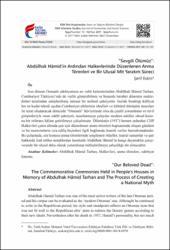| dc.contributor.author | Eskin, Şerif | |
| dc.date.accessioned | 2018-01-02T13:16:34Z | |
| dc.date.available | 2018-01-02T13:16:34Z | |
| dc.date.issued | 2017-12 | |
| dc.identifier.citation | ESKİN, Şerif. "“Sevgili Ölümüz”:Abdülhak Hâmid’in Ardından Halkevlerinde Düzenlenen Anma Törenleri ve Bir Ulusal Mit Yaratım Süreci" FSM İlmî Araştırmalar İnsan ve Toplum Bilimleri Dergisi, 10 (2017): 135-169. | en_US |
| dc.identifier.uri | http://dergi.fsm.edu.tr/index.php/ia/article/view/825 | |
| dc.identifier.uri | https://hdl.handle.net/11352/2569 | |
| dc.description.abstract | Son dönem Osmanlı edebiyatının en velût kalemlerinden Abdülhak Hâmid Tarhan,
Cumhuriyet Türkiyesi’nde de varlık gösterebilmiş ve bununla beraber dönemin muktedirleri
tarafından sahiplenilmiş istisnai bir tarihsel şahsiyettir. Geride bıraktığı külliyat
her ne kadar teknik açıdan Cumhuriyet elitlerinin idealleri ve kültürel dönüşüm tasarıları
ile tezat oluşturacak derecede “Osmanlı” hüviyetinde olsa da çeşitli yorumlama ve tevil
girişimleriyle onun edebî şahsiyeti, tasarlanmaya çalışılan modern-seküler ulusal kanona
bir referans hâline getirilmeye çalışılmıştır. Ölümünün (1937) hemen ardından CHP
Halkevleri çatısı altında şair için düzenlenen anma törenleri kapsamında oluşan gündem
ve bu merasimlerin icra ediliş biçimleri ilgili bağlamda önemli veriler barındırmaktadır.
Bu çalışmada, söz konusu anma törenlerinde sergilenen ritüeller, teatral sunumlar ve şair
hakkında irad edilen nutuklardan hareketle Abdülhak Hâmid’in hangi dayanaklar çerçevesinde
bir ulusal deha olarak yorumlanıp mitleştirilmeye çalışıldığı ele alınacaktır. | en_US |
| dc.description.abstract | Abdulhak Hamid Tarhan was one of the most active writers of the late Ottoman period
and his corpus can be evaluated as the ‘modern Ottoman’ one. Althought he continued
to write in the Republican period, his style and standpoint reflects an Ottoman taste that
was not fit well to the Republican elits’ aims to redress the literary genres according to
their new ideals. Nevertheless after his death in 1937, Hamid’s personality, but not much
his corpus, was used to create a new national(ist) memory and space around his name as
was the case to the most of the literary personas. In these attempts, as a ruling and only
party of the period, People’s Houses hold ceremonies to commemorate Hamid. Strangely
enough these commemorations didn’t aim to respect an important writer’s corpus, but to
the contrary, to perform rituals that were very convenient to the ruling elits’ aspirations
to create a new, secular and modern national memory and space. This article deals with
these ceremonies, rituals and commemorations held in the name of Hamid in all part of
Turkey in order to show that these must be seen as a way of trying to a national myth
around the Republican regime. | en_US |
| dc.language.iso | tur | en_US |
| dc.publisher | FSM Vakıf Üniversitesi | en_US |
| dc.rights | info:eu-repo/semantics/openAccess | en_US |
| dc.subject | Abdülhak Hâmid Tarhan | en_US |
| dc.subject | Halkevleri | en_US |
| dc.subject | Anma törenleri | en_US |
| dc.subject | Edebiyat kanonu | en_US |
| dc.subject | Abdulhak Hâmid Tarhan | en_US |
| dc.subject | People’s Houses | en_US |
| dc.subject | Commemorative ceremonies | en_US |
| dc.subject | Literary canon | en_US |
| dc.title | “Sevgili Ölümüz”: Abdülhak Hâmid’in Ardından Halkevlerinde Düzenlenen Anma Törenleri ve Bir Ulusal Mit Yaratım Süreci | en_US |
| dc.title.alternative | “Our Beloved Dead”: The Commemorative Ceremonies Held in People’s Houses in Memory of Abdulhak Hâmid Tarhan and The Process of Creating a National Myth | en_US |
| dc.type | article | en_US |
| dc.contributor.department | FSM Vakıf Üniversitesi, FSM İlmî Araştırmalar İnsan ve Toplum Bilimleri Dergisi | en_US |
| dc.relation.publicationcategory | Makale - Ulusal Hakemli Dergi - Kurum Öğretim Elemanı | en_US |



















